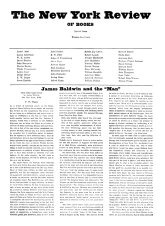When a man writes of himself as a hero, the question is whether he can write heroically. It takes enormous force of temperament, the pressure of an enormously spirited life, to make poems that can fulfill the condition. The poems of a prophet may be biographically interesting as his private letters are interesting, or they may provide him with an escape into wish fulfillment, an outlet for overflow vanity or self-projection. Paul Goodman has labored long as a prophet, a peculiarly concrete type of prophet. He has wanted to turn the dwellers on Manhattan Island facing outward; he has wanted to turn the intolerable not into the ideal, but into the tolerable. He has loved and honored his capital city and suffered over its waste and dishonor; he has equated the best and worst he knows of himself with the best and worst possible for his fellow countrymen.
It is this that gives his poems their fascination: this inseparability of private and public experience, the person and the prophet totally intermingled, so that in his collected poems the richest contemporary themes and the oldest individual experiences stream together: celebrations of sexuality, natural beauty, and communal feeling; pain and fatigue of solitary rebellion; delight in self and body, and self disgust; private desire and passionately jealous love of country; arrogance in singularity and misery in intellectual loneliness; almost every mood of a proud, romantic, unresigned human animal born into the American urban wilderness. It is a big collection, and infuriatingly uneven. There are a lot of occasional poems, for instance, which stand up, if at all, only as parts of the whole: poems which could singly be quoted to support charges of rhetoricism, circumstantially; or humorless monomania. Still, and this is the health and chastening temper of the book, as many others could be quoted back to show that the hero-prophet sees himself in the glass with full awareness of the risks of the heroic posture, not least its self-hypnosis; e.g., the three Henry Hudson poems, or the “Ballad of David and Michael.” The range and pulse of Goodman’s talent is particularly observable in the range of erotic poetry, the painful groping simplicity of “Low Tide”; the satirical and bawdy “Commerce (After the Manner of Wordsworth)”; The Bélli-like Colloquial broadness of the Anacreon sequence, the wry, “Because I Love You, Walking With You.” There are small Lawrentian poems of close physical observation, like “A Daisy” or “Chameleons.” Like Lawrence, Goodman is maddening if you try to call him to your own account and require that he please you everywhere; you are forced to swallow poems you may dislike intensely because they are inseparable from the shameless, generous, insatiable spirit that breathes itself into poems like “Shiva,” “The Weepers’ Tower in Amsterdam,” “In Lydia,” the stunningly direct “If I Only Knew the Truth, I Swear I Would Act on It—“ or the poem entitled “Long Lines.”
The prophet hero believes that what has been touched or known by him has, implicitly, significance: in this lie the risks and the power of his poetry. If in certain cases one is left feeling that Goodman has allowed his deeply informed insights to remain half-formed as poems, or that his act of experiencing has swallowed up the act of converting experience into poetic substance, one must sometimes settle for this if one chooses for this kind of poet. There are few anthology poems, few individual poems to set up as models; yet the entire work is exemplary in that it forces most recent poetry, of whatever camp, to stand up and answer the charge of temperamental thinness. At its best, his diction is not rhetorical but flexible, swift-moving, calling to mind Thoreau’s remark that poetry is nothing but healthy speech. He moves between a foundation of metre (and has written brilliantly un-hidebound sonnets and even ballades with colloquial ease) and a sure accentual verse as in the “Sentences for Mathew Ready,” and many of the shorter poems. The present in which he so fiercely lives is possessed of genuine, as opposed to emulative tradition; one gladly finds no modish invocations to Blake and Rimbaud but a personal (and therefore poetically energizing0 sense of classic antiquity (as His “Danae” or the Anacoreaon poems) and he has a kind of instinctual connection with the profound past: instead of admiring the primitive he seems almost to have been there:
Fiercer than the desire of the eyes
is the rage of punctuality of flowers
that when May breathes, blooming crease by crease
tremble open to the most space
delicately, as they have been trained
almost since when the air was on fire.
or, in “Absalom”:
In the roomy oak among the translucent leaves
fluttering and the coins of light in motion
where nesting sparrows chirrup in commotion
and hop about in fright and a voice grieves
—what is this golden moss that interweavesthe branches like an unaccustomed snare
dismaying birds and gleaming brilliantly?
Is it not human hair in the oak tree?“
Goodman’s book has a social and personal wholeness: its spirit is heroic as Thoreau and Whitman and Hart Crane are heroic. His own poem “Great” sets the dimensions:
Advertisement
Bright was June but suddenly
our agile shadows vanished
hid or were kidnapped away,
we were confronted by no shadows.Immediately felt the thunderbolt
I had a leaping shadow,
it rained. In what peculiar conditions
we men and women soberly live on!The day is periodic with a night
willy-nilly dragged across the sky.
They say I used to live as a larva
in a salt sea in the belly of a beast.When first the rocky crust of this hot globe
hardened, rain fell down from a dark cloud
hundreds of years in lightning-lurid sheets
and filled up the Atlantic Ocean—Son!surely this was great! We call a man
great when he is like the olden times,
the fifty-mile-long stormcloud and its rain
great, peculiar, whether we will or no.
This Issue
February 1, 1963



